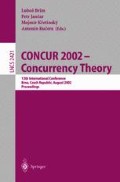Abstract
We show decidability of the satisfiability problem for an extension of the modal μ-calculus with event-recording clocks. Based on techniques for deciding the untimed μ-calculus, we present a complete set of reduction rules for constructing tableaux for formulas of this eventrecording logic. To keep track of the actual value of the clocks, the premises and conclusions of our tableau rules are augmented with timing contexts, which are sets of timing constraints satisfied by the actual value of the clocks. The decidability problem is shown to be EXPTIME complete. In addition, we address the problem of model synthesis, that is, given a formula φ, we construct an event-recording automaton that satisfies φ.
This research was supported by the National Science Foundation under grants CCR-00-82560 and CCR-00-86096.
Also affiliated with University of Ulm, Germany.
Access this chapter
Tax calculation will be finalised at checkout
Purchases are for personal use only
Preview
Unable to display preview. Download preview PDF.
References
R. Alur. Techniques for Automatic Verification of Real-Time Systems. PhD thesis, Stanford University, 1991.
R. Alur, C. Courcoubetis, and D. Dill. Model checking in dense real-time. Information and Computation, 104(1):2–34, 1993.
R. Alur, L. Fix, and T. A. Henzinger. Event-clock automata: A determinizable class of timed automata. Theoretical Computer Science, 211(1–2):253–273, 1999.
Rajeev Alur and David L. Dill. A theory of timed automata. Theoretical Computer Science, 126(2):183–235, 25 April 1994.
Rajeev Alur, Tomás Feder, and Thomas A. Henzinger. The benefits of relaxing punctuality. Journal of the ACM, 43(1):116–146, January 1996.
Rajeev Alur and Thomas Henzinger. Real-time logics: Complexity and expressiveness. Information and Computation, 104(1):35–77, May 1993.
Rajeev Alur and Thomas A. Henzinger. A really temporal logic. Journal of the ACM, 41(1):181–204, 1994.
Conrado Daws and Stavros Tripakis. Model checking of real-time reachability properties using abstractions. Lecture Notes in Computer Science, 1384:313–329, 1998.
Deepak D’souza. A logical characterization of event recording automata. In Proceedings of FTRTFT, volume 1926 of LNCS, 2000.
E. Allen Emerson and Charanjit S. Jutla. The complexity of tree automata and logics of programs. In 29th Annual Symposium on Foundations of Computer Science, pages 328–337. IEEE, 1988.
E. Allen Emerson and Charanjit S. Jutla. On simultaneously determinizing and complementing ω-automata (extended abstract). In Proceedings, Fourth Annual Symposium on Logic in Computer Science, pages 333–342, 1989.
E. Allen Emerson, A. K. Mok, A. Prasad Sistla, and Jai Srinivasan. Quantitative temporal reasoning. LNCS, 531:136–145, 1991.
S. Graf and J. Sifakis. A modal characterization of observational congruence on finite terms of CCS. Information and Control, 68(1–3):125–145, 1986.
T. A. Henzinger, X. Nicollin, J. Sifakis, and S. Yovine. Symbolic model checking for real-time systems. Information and Computation, 111(2):193–244, June 1994.
R. Koymans. Specifying real-time properties with metric temporal logic. Real-Time Systems, 2(4):255–299, November 1990.
D. Kozen. Results on the propositional mu-calculus. Theoretical Computer Science, 27(3):333–354, December 1983.
F. Laroussinie, K. G. Larsen, and C. Weise. From timed automata to logic— and back. Lecture Notes in Computer Science, 969:529–539, 1995.
K. G. Larsen, P. Pettersson, and W. Yi. Model-checking for real-time systems. Lecture Notes in Computer Science, 965:62–88, 1995.
Damian Niwiński and Igor Walukiewicz. Games for the μ-calculus. Theoretical Computer Science, 163(1–2):99–116, 1996.
P. Pettersson. Modelling and Verification of Real-Time Systems Using Timed Automata: Theory and Practice. PhD thesis, Uppsala University, 1999.
Jean-FranÇois Raskin and Pierre-Yves Schobbens. The logic of event clocks: Decidability, complexity and expressiveness. Journal of Automata, Languages and Combinatorics, 4(3):247–282, 1999.
Maria Sorea. Results on event-recording logic. Technical Report SRI-CSL-01-06, Computer Science Laboratory, SRI International, 2001. http://www.csl.sri.com/papers/csl-01-06/.
Maria Sorea. Tempo: A model-checker for event-recording automata. Technical Report SRI-CSL-01-04, Computer Science Laboratory, SRI International, 2001. A short version appeared at the Workshop on Real-Time Tools 2001, Aalborg, Denmark. http://www.csl.sri.com/papers/csl-01-04/.
B. Steffen and A. Ingólfsdóttir. Characteristic formulae for processes with divergence. Information and Computation, 110(1):149–163, April 1994.
C. Stirling and D. Walker. Local model checking in the modal mu-calculus. Theoretical Computer Science, 89(1):161–177, 1991.
R. S. Streett and E. A. Emerson. An automata theoretic decision procedure for the propositional mu-calculus. Information and Computation, 81(3):249–264, 1989.
Howard Wong-Toi. Symbolic Approximations for Verifying Real-Time Systems. PhD thesis, Stanford University, November 1994.
Author information
Authors and Affiliations
Editor information
Editors and Affiliations
Rights and permissions
Copyright information
© 2002 Springer-Verlag Berlin Heidelberg
About this paper
Cite this paper
Sorea, M. (2002). A Decidable Fixpoint Logic for Time-Outs* . In: Brim, L., Křetínský, M., Kučera, A., Jančar, P. (eds) CONCUR 2002 — Concurrency Theory. CONCUR 2002. Lecture Notes in Computer Science, vol 2421. Springer, Berlin, Heidelberg. https://doi.org/10.1007/3-540-45694-5_18
Download citation
DOI: https://doi.org/10.1007/3-540-45694-5_18
Published:
Publisher Name: Springer, Berlin, Heidelberg
Print ISBN: 978-3-540-44043-7
Online ISBN: 978-3-540-45694-0
eBook Packages: Springer Book Archive

